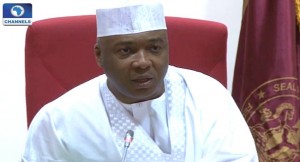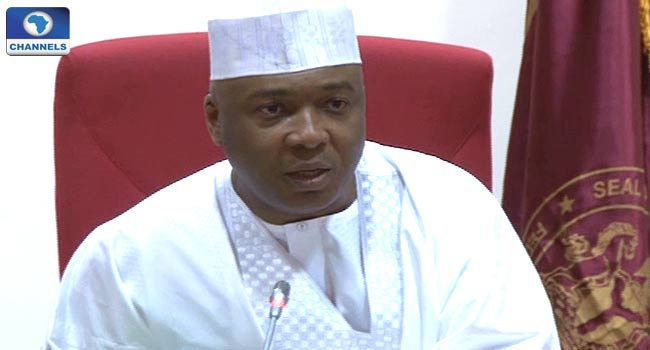
The amended charges, which are coming more than 7 months after the commencement of his trial, replaces the thirteen count charge initially preferred against him.
Three of the charges among other things, accused the Senate President of failing to declare ownership of an American Express card account.
The two charges read, “That you on or about September 16, 2013 within the jurisdiction of this honorable tribunal did make a false declaration in the asset declaration form for public officers which you filled and submitted to the Code of Conduct Bureau upon assumption of office as the Governor of kwara State in the year 2003 by your failure to declare your leasehold interest in number 42, Remi Fani-kayode street, Ikeja, Lagos, which you acquired through your company, Skyview Properties Limited from first Finance Trust Limited on December 12, 1996 and you thereby committed an offence contrary to section 15(1)(2) of the Code of Conduct Bureau and Tribunal Act. CAP. C15, laws of the federation of Nigeria, 2004 and as incorporated under paragraph 11(1) (2), I fifth schedule to the constitution of the Federal Republic of Nigeria, 1999 (as amended) and punishable under section 23(2) of the Code of Conduct Bureau and Tribunal Act as incorporated under paragraph 18, Part I of the fifth schedule to the constitution of the federal republic of Nigeria, 1999 (as amended).”, it read
“That you between June 2011 and October 2013, within the jurisdiction of this honorable tribunal, did receive monthly salaries or emoluments as governor of kwara state and at the same time, from the federal government as a senator of the federal republic of Nigeria and you thereby committed an offence contrary to section 6(a) of the Code of Conduct Bureau and Tribunal Act. CAP. C15, laws of the federation of Nigeria, 2004 and as incorporated under paragraph 2(a), Part I of the, fifth schedule to the constitution of the Federal Republic of Nigeria, 1999 (as amended) and punishable under section 23(2) of the Code of Conduct Bureau and tribunal act as incorporated under paragraph 18, Part I of the fifth schedule to the constitution of the federal republic of Nigeria, 1999 (as amended).”
The Code of Conduct Tribunal, ruled and accepted an amended the 16-count charge filed by the prosecution against the Senate President, Dr Bukola Saraki despite objection from the defence counsel.
This came up just after the Chairman of the Code of Conduct Tribunal, Justice Danladi Umar, dismissed the application filed by Senate President, Dr. Bukola Saraki seeking Umar’s withdrawal from his trial, holding that the application lacks absolute merit.
Cross examination of prosecution witness, Mr Micheal Wetkas, by the defence counsel was about to begin when the prosecution asked to withdraw the former charge against the Senate President and requested the leave of the court to enable him read the amended charges to the Senate President.
The former charge was filed on October 18, 2015 and Mr Jacobs asked the court to accept the new charges, dated April 27, 2016 as the case against the Senate President.
According to him, the fresh charges are necessitated by the evidence to be given and the facts in them.
Responding to the application, counsel to Dr. Saraki, Mr Paul Usoro, said that relying on Section 216, sub section 1 of the Administration of Criminal Justice Act, the business of amending a charge is at the discretion of the tribunal.
“The point we make is that the discretion can only be exercised based on facts before the tribunal and there is no such application before the tribunal.
“So it should be filed and we can reply to it, particularly since we are cross examining based on each of the counts and we should also be given an opportunity to react,” he said.
He further said that an amendment is not a matter of force, but at the discretion of the court.
He argued further that the position of the prosecution that the fresh charges are necessitated by facts raised in its witness’ testimony needs to be proven as it cannot just be announced from bar or orally.
He noted that he was not opposed to the withdrawal of the first charges filed but has “a problem with the one he is applying to replace it with”.
“For us to be able to say yes or no we need the particulars that show the facts.”
The prosecution counsel, Mr Rotimi Jacobs, in his response, said that the only issue to determine is whether Section 216 requires a formal application before the prosecution can amend its charges.
He submitted that there is no provision for that requirement but instead it says whenever the prosecution wants to amend at any time before judgment, he should do so and draw the attention of the court to it but ensure that it is read out to the understanding of the accused.
This he said is according to Section 163 of the Criminal Procedure Act.
Ruling, the Chairman of the tribunal agreed with the prosecution that there is no condition precedent for the charge to be amended.
He held that it is automatic and straightforward, therefore the prosecution needs not give any reason provided it is done before judgment.



